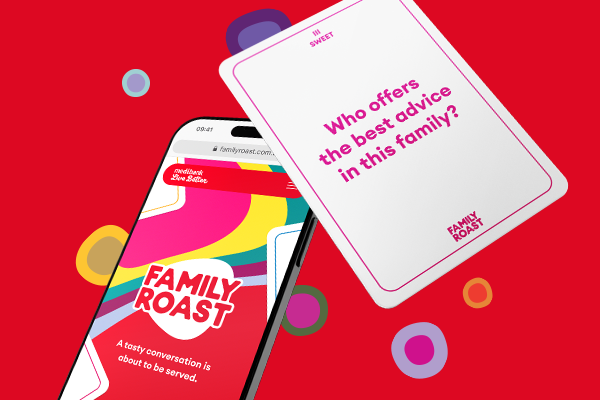Is it time for a D&M with your DNA?
News Corp Australia's The Growth Distillery & Medibank's joint research1 into mental health found many Australians are craving more meaningful conversations with family, particularly with their parents.
We've used the findings to create this conversation guide, to help more Australians get from small talk to real talk. Because the more we connect, the better our mental wellbeing can be.
The research found:
90% of Australians say they feel better after talking about mental wellbeing, but many of us are still hesitant to have the conversation.
73% of Australians think talking regularly about mental wellbeing makes it easier when there is a serious issue.
47% of young adults want to have more conversations with their parents.
Get together and have a tasty conversation.
The Medibank Family Roast is a card game designed to get families connecting and talking. Because when the bonds of family are stronger, Australia is stronger. So get around the dinner table, it’s time to serve the questions you’ve always wanted to know the answer to.

When family isn't an option
Talking to family is not always possible, or right for everyone. Read more on finding connection outside your family unit and how to look after your mental wellbeing.
Tips for turning small talk into real talk
News Corp Australia's The Growth Distillery & Medibank's joint research1 found almost half of young adults surveyed wanted to have more meaningful conversations with their parents. However, two thirds say it would be hard to tell their parents they are having challenges or struggling with their mental wellbeing.
Encourage your adult children to open up with these tips.
- Choose the right time and place.
Somewhere safe and comfortable is important. Casual settings like your house or in the car can be good places to talk. Make sure you are both feeling calm, present and have the time to chat properly.
- Open up first.
Showing your adult children that everyone faces challenges (parents included) can make it easier, and demonstrate it’s a safe place to share. Read more about the power of opening up.
- Be curious.
Ask open-ended questions, for example, ‘I’ve noticed lately that you...?’ or ‘Is there anything you’d like to talk about?’.
- Talk about small problems first.
We often find it easier to talk about things like work stress or global events. Starting with these kinds of topics can help test the waters and lay the foundation for more meaningful conversations.
- Listen with care.
Try to understand, show empathy, and acknowledge their feelings. Avoid making judgements or downplaying any issues. Read more about how to practice active listening.
- Avoid problem-solving.
As a parent, it’s easy to jump into solution mode. But most of the time, our children just want the space to share what they are going through. If you do have some advice, ask if they would like it before you share.
- Do it regularly.
Talking about your mental wellbeing when things are going well makes it easier to talk when things are not going so well. Just like many things, conversation is a skill that takes practice.
Opening up to loving and supportive family members can help you feel more connected, and can have a positive impact on your mental wellbeing.
Here’s how to get started.
- Choose the right time and place.
Somewhere safe and comfortable is important. Casual settings like your house or in the car can be good places to talk. Make sure you are both feeling calm, present and have the time to chat properly.
- Be curious.
It may sound obvious, but good conversations go both ways. Ask open-ended questions about what’s going on in your parents’ lives. If they start by sharing something, it might make you feel more comfortable to share something too. Read more about the power of opening up.
- Share at your own pace.
It’s OK if you don’t want to share everything. Start by sharing something small, for example, a bad day at work. It can help test the waters for safety and lay the foundation for more open conversations.
- Be clear about what you need.
It’s easy for parents to jump into solution mode. If you just want someone to listen, let them know before you share something.
- Do it regularly.
Talking about your mental wellbeing when things are going well makes it easier to talk when things are not going so well. Just like many things, meaningful conversation is a skill that takes practice.
- A disappointing response is not about you.
Most of the time, opening up about something difficult helps us feel better. But if you don’t get the response you hoped for from your parents, there are things you can do. Read more about finding connection outside your family unit.
Sharing life’s ups and downs with a loving and supportive family member - whether it’s a partner, sibling or someone else - can strengthen your relationship and have a positive impact on your mental wellbeing.
Here’s how to get started.
- Choose the right time and place.
Somewhere safe and comfortable is important. Casual settings like your house, the car or during a shared activity can be a good time and place to talk. Make sure you are both feeling calm, present and have the time to chat properly.
- Be curious.
It may sound obvious, but good conversations go both ways. Ask open-ended questions about what’s going on in their life. If they start by sharing something, it might prompt you to share something too. Read more about the power of opening up.
- Share at your own pace.
It’s OK if you don’t want to share everything. Start by sharing something small, for example, a bad day at work. It can help test the waters for safety and lay the foundation for more open conversations.
- Be clear about what you need.
It’s easy for family to jump into solution mode. If you just want someone to listen, let them know before you share something.
- Do it regularly.
Talking about your mental wellbeing when things are going well makes it easier to talk when things are not going so well. Just like many things, having meaningful conversation is a skill that takes practice.
- A disappointing response is not about you.
Most of the time, opening up about something difficult helps us feel better. But if you don’t get the response you hoped for, they may not be the right person to connect with for now. Read more about finding connection outside your family unit.
We need to talk about the generational divide
Dr Chris Robinson, Medibank's Chief Medical Officer explains that the generational divide may be stopping us from providing emotional support to those we care about when they need it the most. Let's start the conversation.
Click the video to watch
Read more about connection and conversation

How to speak to a loved one about mental health
We spoke with Medibank psychologist, Alison Sutton about how to start having more meaningful mental health conversations with our loved ones.

The power of opening up
It can be a lonely feeling to seem like you’re not totally understood. Opening up about how you’re feeling might help.

How to practice active listening
Active listening is much more than just hearing what another person is saying. Learn how to have a meaningful conversation without talking.
Support when you need it
Talking openly with family is not always easy. If you need professional mental health support, help is available.

Things you should know
1 About the research: The research was undertaken by News Corp Australia's The Growth Distillery. Fieldwork was conducted across all states and territories, including metropolitan and rural/regional areas, between 11-25 February 2025, collecting a total of 2,565 responses.
While we hope you find this information helpful, please note that it is general in nature. It is not health advice, and is not tailored to meet your individual health needs. You should always consult a trusted health professional before making decisions about your health care. While we have prepared the information carefully, we can’t guarantee that it is accurate, complete or up-to-date. And while we may mention goods or services provided by others, we aren’t specifically endorsing them and can’t accept responsibility for them. For these reasons we are unable to accept responsibility for any loss that may be sustained from acting on this information (subject to applicable consumer guarantees).
